What makes Turkish breakfast a global culinary gem?
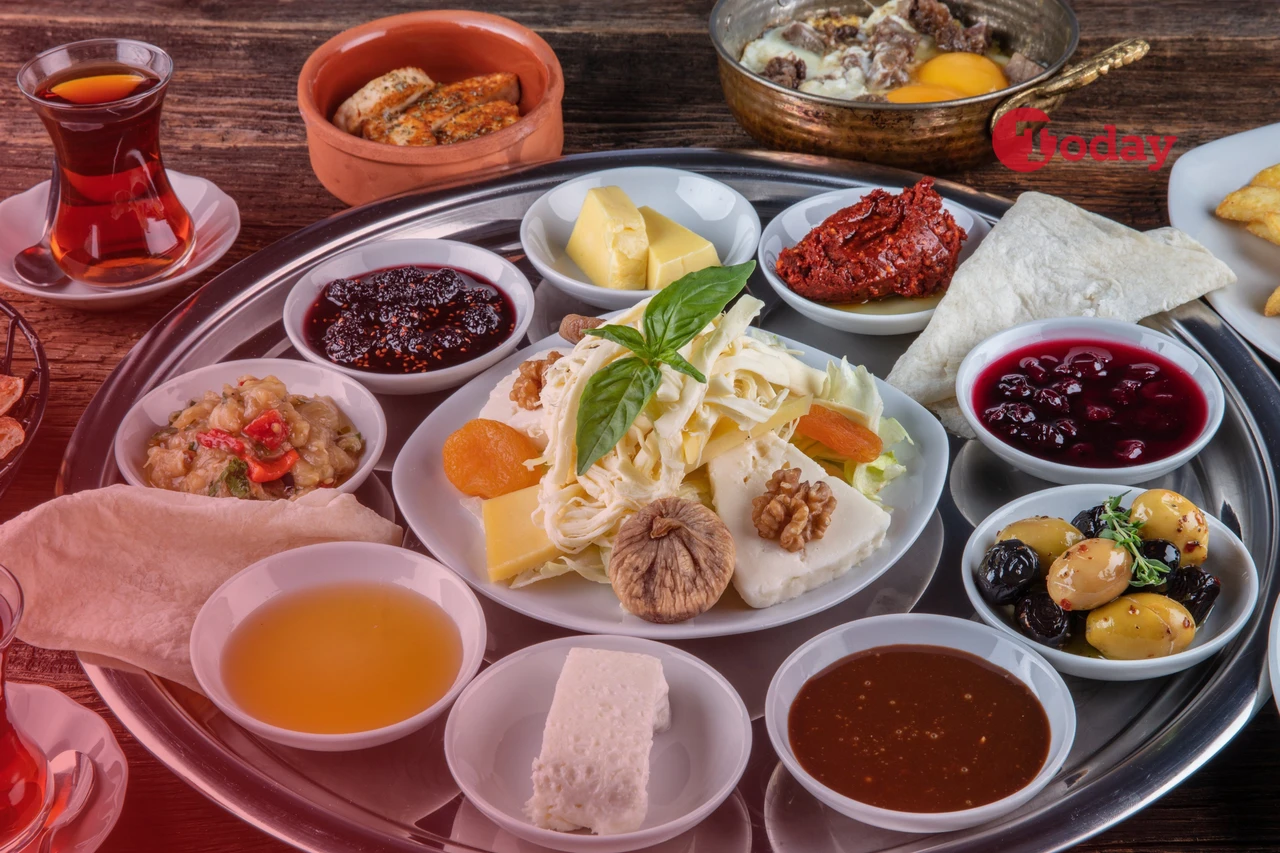 A collage of traditional Turkish breakfast photo, December 26, 2024. (Photo via Yemek Sepeti/Collage by Türkiye Today)
A collage of traditional Turkish breakfast photo, December 26, 2024. (Photo via Yemek Sepeti/Collage by Türkiye Today)
Breakfast in Türkiye holds a unique and significant place in daily life. With its diverse geography, each region of Türkiye has its own traditional breakfast rituals. However, some essentials remain unchanged across the country—olives, cheese, honey, eggs, jam, and baked goods are integral parts of the Turkish breakfast table.
Evolution of Turkish breakfast
The concept of breakfast in Turkish kitchens dates back to the early 20th century. Initially, breakfast was a light meal consisting of soup, bread, cheese and jam, aimed at soothing the stomach in the morning.
Over time, breakfast evolved into the main meal of the day, adapted according to the customs of each country. Türkiye’s rich geography has created an equally diverse and abundant breakfast culture, where regional variations reflect the nation’s culinary heritage.
Global culinary gem: Turkish breakfast
Not only is Türkiye famous for its cultural heritage and rich geography, but its cuisine also attracts global attention. The Turkish breakfast table, which combines elements from Ottoman, Central Asian, Eastern European and Middle Eastern cuisines, is one of the most important parts of Turkish culinary traditions.
If you’re curious about what a traditional Turkish breakfast includes, you’ll find an array of cheeses, various types of eggs, jams, baked goods, and an extensive deli menu. Turkish breakfast is not only rich in flavors but also supports a healthy lifestyle, with all food groups represented. This search for hearty and flavorful meals has made the Turkish breakfast table famous worldwide.
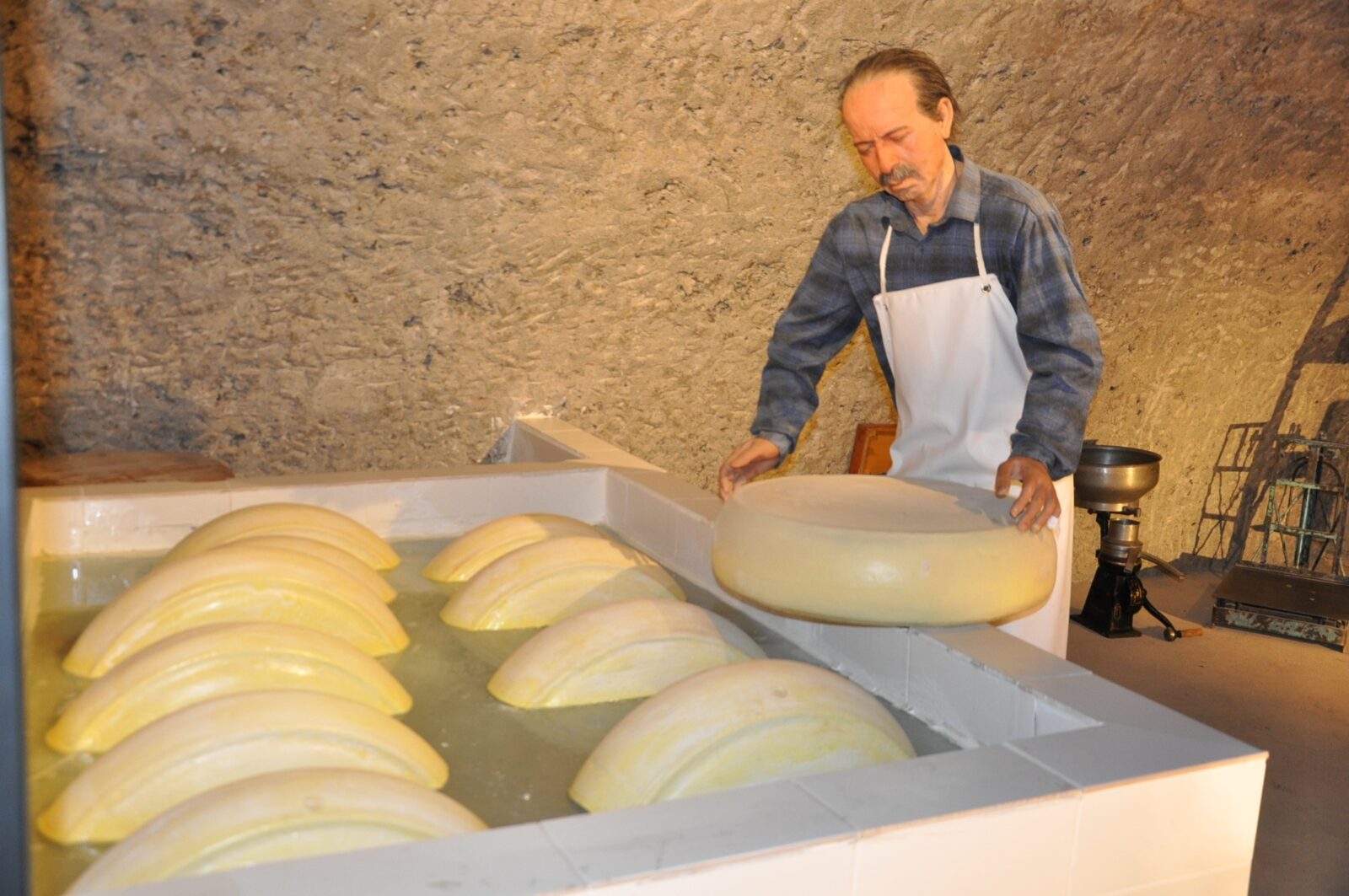
Cheese: Star of Turkish breakfast
Cheese is the crown jewel of the Turkish breakfast table. White cheese, along with braided, Yoruk, and cottage cheeses, which blend perfectly with honey and jam, are essential elements of the breakfast spread. Every region of Türkiye offers its own special cheese varieties.
Among the most well-known are Izmir’s tulum cheese, Ezine and Edirne’s sheep cheese, Kars’ kasar and gruyere, Van’s herbed cheese, and Konya’s moldy cheese. Other notable cheeses include Manyas’s cottage cheese, Mihalic cheese from the Aegean, Karadeniz’s (Black Sea) kolot cheese, Kayseri’s pot cheese, Erzurum’s civili cheese, Mus’ goat cheese, and the smoked Abaza cheese from Bolu and Adapazari.
Seasonal vegetables and fruits in Turkish breakfast
One of the most distinguishing features of Turkish breakfast is the consumption of seasonal vegetables and fruits. The cheeses are often paired with these vegetables, particularly with the classic salad of sliced tomatoes and cucumbers.
Fruits like oranges, bananas, and apples are popular in the winter months, while watermelon, melon, and grapes dominate during the summer.

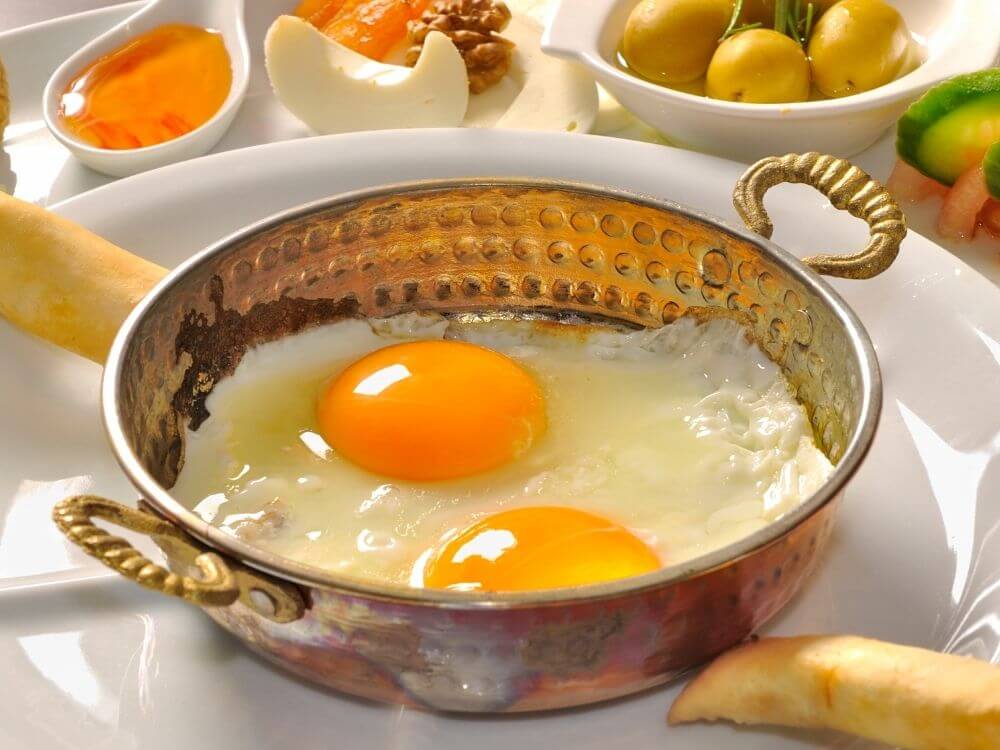
Eggs: Heart of Turkish breakfast
Eggs hold a special place in Turkish breakfast. While boiled eggs are simple, the real treat is menemen, a dish made by sauteing tomatoes and peppers and adding eggs. In some regions, onions are also included in the recipe. Other variations include sahanda eggs with sausage or pastrami, and cilbir, a poached egg dish with yogurt.
Additionally, eggs fried with bread make yumurtali ekmek, a beloved breakfast dish in Türkiye.
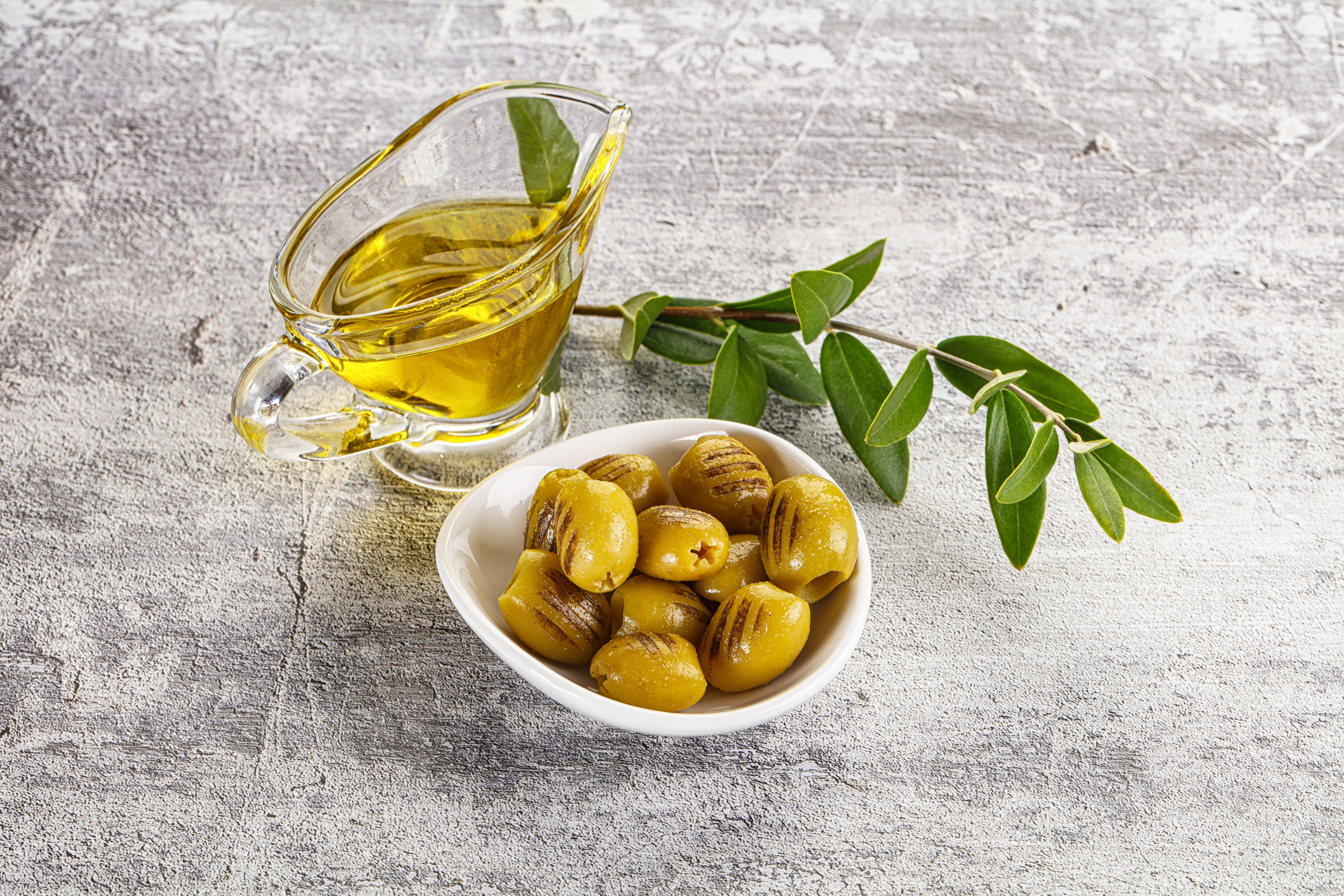
Olives: Symbol of Turkish breakfast
Olives, grown throughout Türkiye but especially abundant in the Aegean region, are another key ingredient in Turkish breakfast.
The region’s famous green olives from Ayvalik, Edremit and Burhaniye, along with oily sele olives, add a burst of flavor to the table.
Baked goods: Delicious tradition
No Turkish breakfast is complete without a variety of baked goods. From different types of bread to various savory pastries like borek (filled pastry), the offerings are endless. Pisi, fried dough, is another favorite, along with pogaca (savory pastry), acma (sweet bread), and gozleme (flatbread with fillings). Simit, a sesame-crusted bread, is also an iconic part of Turkish breakfast and is best enjoyed with cheese and jam.
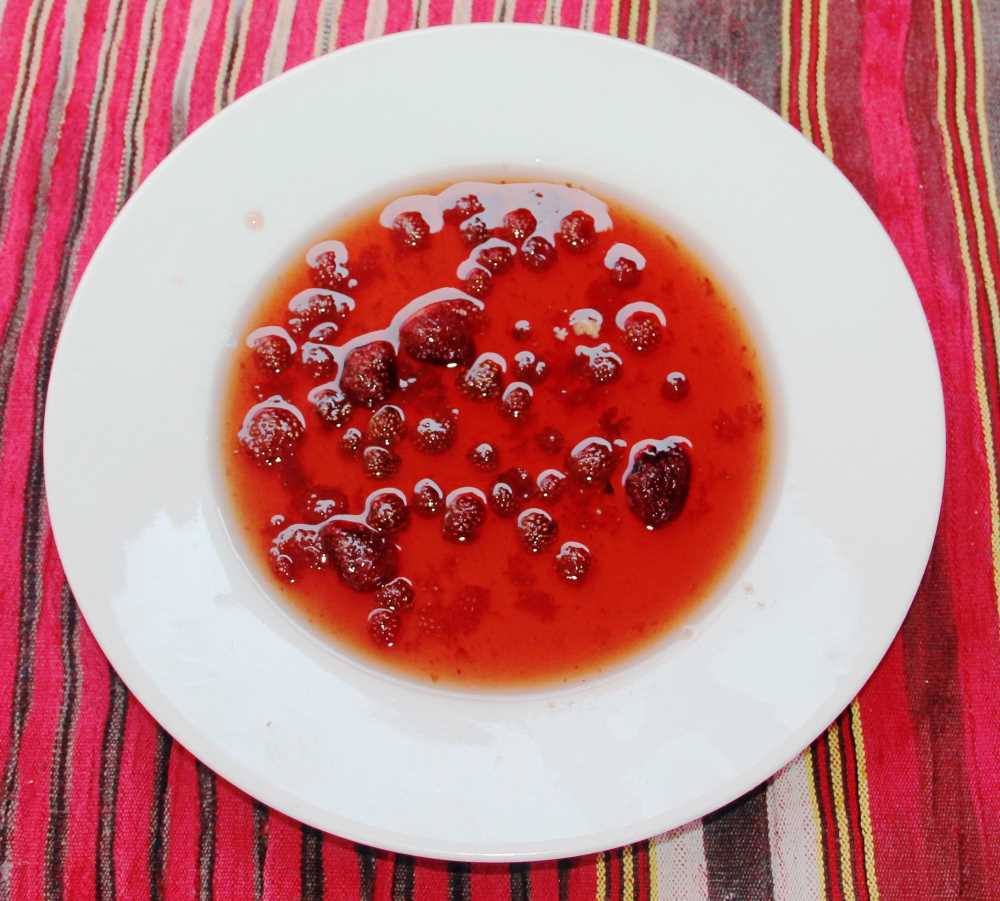
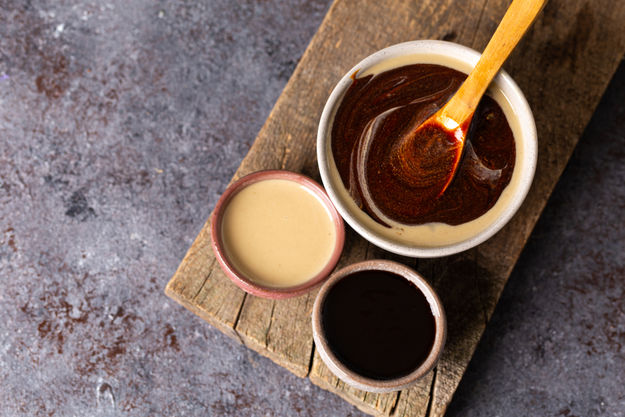
Sweet endings: Jam, tahini and pekmez
Turkish breakfast often concludes with a sweet touch, including tahini from the Mediterranean region, and pekmez (molasses) from Anatolia. Tahini, made from sesame seeds, is rich in vitamins and provides long-lasting satiety. Pekmez, made from fruits such as grapes, figs, mulberries, dates, and carob, is a natural sweetener.
Homemade jams, often featuring local fruits, add a unique sweetness to the meal. In the Afyon region, kaymak (clotted cream) is a traditional accompaniment, especially when paired with honey, creating a memorable culinary experience.
Regional breakfast specialties across Türkiye
Aegean breakfast: Herbal delight
The Aegean region is known for its generous use of herbs in breakfast. Alongside white cheese and olives, regional herbs complement the meal.
A type of pastry called boyoz is also a typical Aegean breakfast dish.

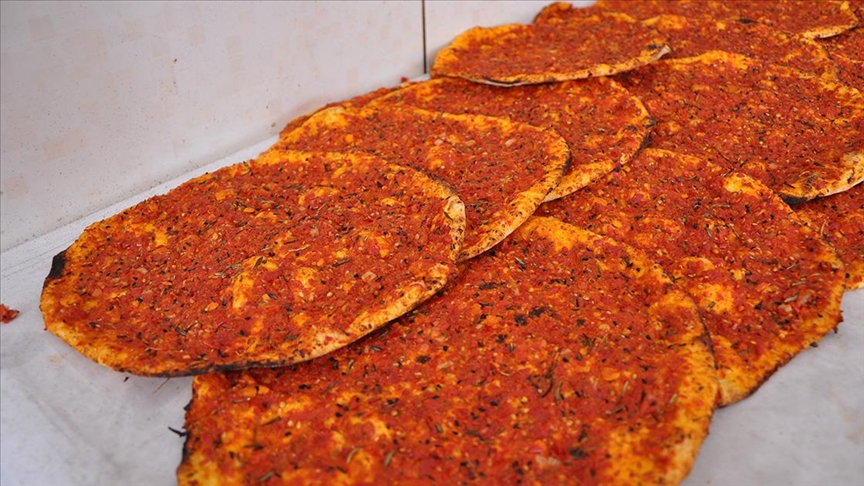
Mediterranean breakfast: Sweet and savory
In the Mediterranean, breakfast is never without jam. Other highlights include biberli ekmek (bread with peppers) and kaytaz boregi (a type of pastry), which are favorites in this region.
Central Anatolian breakfast: Hearty feast
In Central Anatolia, breakfast reaches new heights, with offal like kelle (sheep’s head) and paca (tripe) accompanying the usual spread. Sucuk (sausage), pastirma (cured beef), and cemen (spiced paste) often make an appearance.
Eastern and Southeastern Anatolian breakfast: Rich in tradition
In the Eastern and Southeastern Anatolian regions, offal is also a common breakfast dish. Ciger (liver) is often featured, and beyran soup, semsek (meat pastry), zahter (herb mixture), Antep katmeri (sweet pastry), and fistikli durum (pistachio wrap) are beloved dishes in these regions.

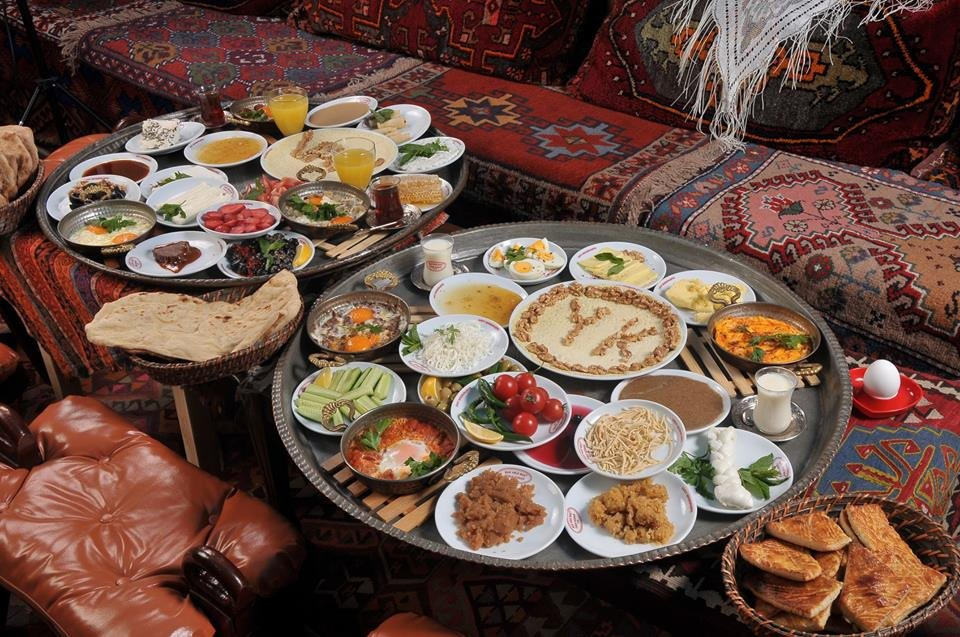
Van breakfast: Cultural gem
Van’s breakfast culture is one of the most famous in Türkiye, thanks to the city’s position on the Silk Road. A typical Van breakfast includes local honey, yogurt cream, clotted cream, yayik tereyagi (churned butter), cacik (yogurt dip), herbed cheese, orme peynir (braided cheese), beyaz peynir (white cheese), eggs with kavurma (roast meat) or sausage, olives, murtuga (egg and flour mixture), kavut (flour-based porridge) and lavas (flatbread) baked in special ovens.
Gaziantep breakfast: Flavor explosion
Known for its UNESCO-recognized cuisine, Gaziantep offers one of the richest breakfast spreads in Türkiye. In addition to the usual cheeses, olives, jams, and pastries, beyran soup, cartlak kebabi (meat kebab), and ciger (liver) are common breakfast items in Gaziantep.
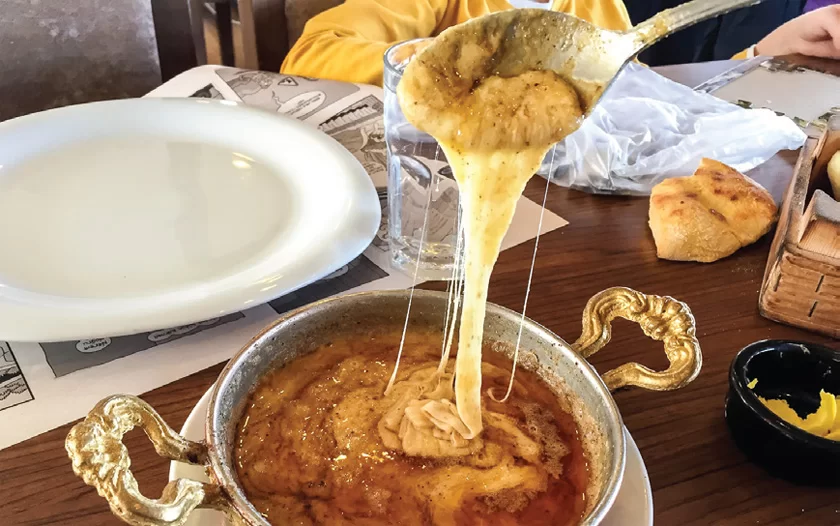

Black Sea breakfast: Festive affair
In the Black Sea region, breakfast turns into a grand celebration. Specialties like mısır ekmegi (cornbread), kuymak (cornmeal and cheese dish), kaygana (Turkish pancake), and tursu kavurmasi (sauteed pickles) are popular. The region’s breakfasts are as rich and varied as its landscapes.
Tea: Essential beverage of Turkish breakfast
No Turkish breakfast is complete without tea. With a history of over 5,000 years, Turkish tea has become a staple of the breakfast table. Served in slender glasses, çay (tea) is enjoyed throughout the day, but it holds a special place during breakfast. The key to a perfect breakfast is well-brewed tea, especially when made with freshly picked leaves from the Black Sea region.
No matter where you are in Türkiye, the breakfast table will offer a variety of flavors, but one thing remains constant: it is never complete without tea. The Turkish breakfast is a celebration of diverse regional flavors and ingredients, making it a truly unique and unforgettable experience.



